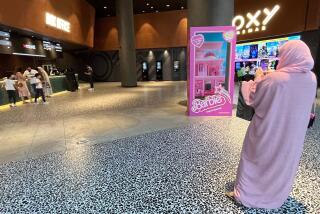Disney Films Insult Arabs, Protesters at Studio Say
- Share via
BURBANK — Arab American leaders Thursday protested outside Walt Disney studio against two Disney films that the protesters said contain insults to Arabs, accusing the entertainment giant of breaking a 1993 agreement to confer with them to prevent stereotypical portrayals.
The protesters stopped short of calling for an American boycott of Disney, as conservative Protestant groups did recently on other issues.
But Don Bustany, spokesman for the American-Arab Anti-Discrimination Committee, told a curbside news conference that Muslim groups based in Washington have already asked foreign countries with large Islamic populations to boycott Disney products until the company “stops doing what it is doing to Arabs.”
Disney officials declined to comment Thursday.
Bustany and other Arab American leaders objected to an assortment of villainous Arabic-like characters in “Kazaam,” starring Shaquille O’Neal, and a nasty, sharp-dealing neighbor named Habib in last year’s “The Father of the Bride, Part II.”
“They should show that not all Arabs are villains,” said Monir Deeb, president of the Los Angeles chapter of the committee. “There should be a balance.”
The villains in “Kazaam” include a black marketeer named Malik--the Arabic word for “owner”--the protesters said.
“I don’t think there is a deliberate attempt to harm Arab Americans,” Bustany said. “But I believe there are people who harbor less than positive feelings about Arabs in general and if they get a chance to slam Arabs, they will do that--just as it happened for decades against black Americans, Asian Americans and American Indians.”
The committee members were particularly offended, Bustany said, by what the members regarded as a breach by Disney executives of an oral promise in June 1993 to consult with them about any projects involving Arabs, after a protest against the animated musical “Aladdin.”
“If they deny that they made such an agreement, then why has the TV animation division been operating under the agreement with us very constructively and very amiably?” he said.
“They were heroes three years ago,” said Bustany, referring to Arab American elation after Disney changed some lyrics in “Aladdin,” which they had protested as promoting an insultingly stereotypical image of Arabs.
As evidence that such an understanding has been in effect, Bustany said that on Feb. 29, in one of many letters he sent to Disney Chairman Michael Eisner, he noted that Disney officials accepted the committee’s suggested changes in the television version of “Aladdin” and in the script for a spinoff film, “Aladdin and the King of Thieves.”
Other studios have been cooperative, he said.
Since Arab Americans objected to scenes in the Warner Bros. movie “Executive Decision,” that studio “has been consulting with us in advance,” Bustany said. He also said that the Hanna-Barbera animation studio offered voluntarily to show scripts to Arab American groups before shooting.
The Rev. Darrel Meyers, pastor of Van Nuys Presbyterian Church and chairman of the Mideast Fellowship of Southern California, was one of the group picketing Disney. “I’ve seen so many films that have denigrated Arab people gratuitously,” he said. “It has to stop. When you defame people you can dispossess them and you can destroy them.”
Guy Aoki, president of the Media Action Network for Asian Americans, said that the two Disney films being protested illustrate that “executives in these companies are really living in the dark ages when it comes to minorities.”
The Muslim Public Affairs Council in Los Angeles has scheduled a conference Sept. 13 with film executives to discuss Muslim sensitivities and the marketing possibilities in the Arab and non-Arab Islamic countries, said Salaam Al-Marayati, council director, who took part in Thursday’s protest.
“We will have representatives from DreamWorks and Warner Bros., but we have had no response yet from [Disney’s] Eisner or other . . . studios,” he said.
More to Read
The biggest entertainment stories
Get our big stories about Hollywood, film, television, music, arts, culture and more right in your inbox as soon as they publish.
You may occasionally receive promotional content from the Los Angeles Times.










